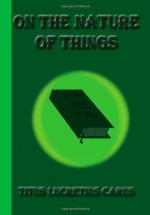|
This section contains 856 words (approx. 3 pages at 400 words per page) |

|
War and Friendship
As an Epicurean, Lucretius opposes war and values friendship and cooperation. He carries out these twin themes in De rerum natura, painting dreadful, gruesome pictures of war and pleasant pictures of people enjoying each other's company and supporting each other. Lucretius frequently uses war imagery to illustrate scientific points about atoms and nature. Describing the occurrence of accidents, he introduces the story of Helen of Troy and the Trojan War that resulted from her abduction. In Book Three, Lucretius explains that there is no reason to fear death, using an illustration from the Peloponnesian Wars to make his point. He writes that during these horrific wars, everyone lived in fear of which side would triumph and who would subsequently rule them. According to Lucretius, this is how most people view death. Letting go of one's fear of death, however, means releasing the fear of which "side...
|
This section contains 856 words (approx. 3 pages at 400 words per page) |

|




